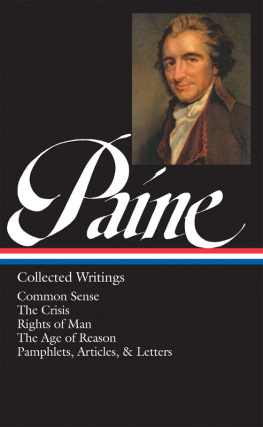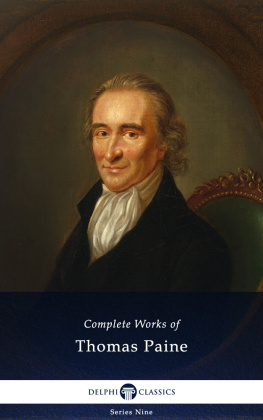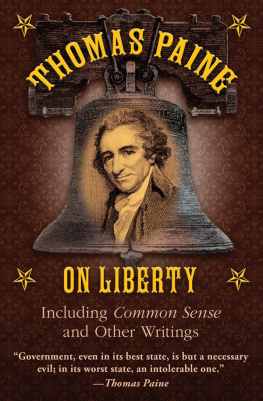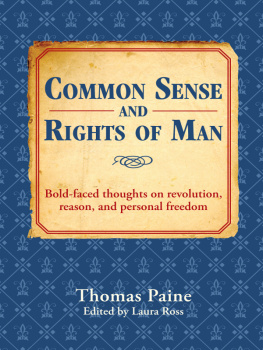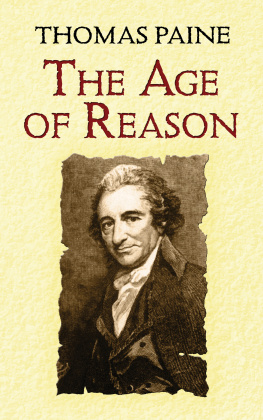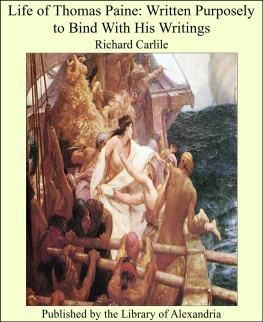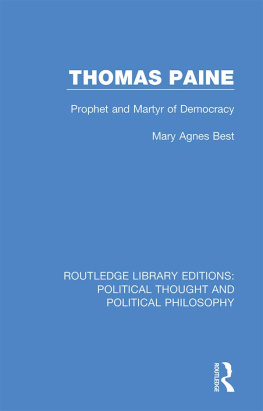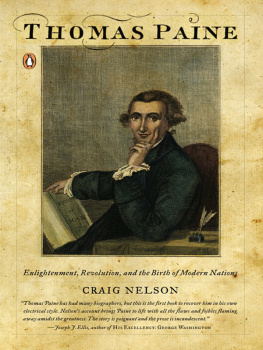Thomas Paine - The Thomas Paine Reader
Here you can read online Thomas Paine - The Thomas Paine Reader full text of the book (entire story) in english for free. Download pdf and epub, get meaning, cover and reviews about this ebook. genre: Politics. Description of the work, (preface) as well as reviews are available. Best literature library LitArk.com created for fans of good reading and offers a wide selection of genres:
Romance novel
Science fiction
Adventure
Detective
Science
History
Home and family
Prose
Art
Politics
Computer
Non-fiction
Religion
Business
Children
Humor
Choose a favorite category and find really read worthwhile books. Enjoy immersion in the world of imagination, feel the emotions of the characters or learn something new for yourself, make an fascinating discovery.
- Book:The Thomas Paine Reader
- Author:
- Genre:
- Rating:4 / 5
- Favourites:Add to favourites
- Your mark:
- 80
- 1
- 2
- 3
- 4
- 5
The Thomas Paine Reader: summary, description and annotation
We offer to read an annotation, description, summary or preface (depends on what the author of the book "The Thomas Paine Reader" wrote himself). If you haven't found the necessary information about the book — write in the comments, we will try to find it.
The Thomas Paine Reader — read online for free the complete book (whole text) full work
Below is the text of the book, divided by pages. System saving the place of the last page read, allows you to conveniently read the book "The Thomas Paine Reader" online for free, without having to search again every time where you left off. Put a bookmark, and you can go to the page where you finished reading at any time.
Font size:
Interval:
Bookmark:
PENGUIN  CLASSICS
CLASSICS
Thomas Paine was born in Thetford, England, in 1737, the son of a staymaker. He had little schooling and worked at a number of jobs, including tax collector, a position he lost for agitating for an increase in excisemens pay. Persuaded by Benjamin Franklin, he emigrated to America in 1774. In 1776 he began his American Crisis series of thirteen pamphlets, and also published the incalculably influential Common Sense, which established Paine not only as a truly revolutionary thinker, but as the American Revolutions fiercest political theorist. In 1787 Paine returned to Europe, where he became involved in revolutionary politics. In England his books were burned by the public hangman. Escaping to France, Paine took part in drafting the French constitution and voted against the kings execution. He was imprisoned for a year and narrowly missed execution himself. In 1802 he returned to America and lived in New York State, poor, ill, and largely despised for his extremism and so-called atheism (he was in fact a deist). Thomas Paine died in 1809. His body was exhumed by William Cobbett, and the remains were taken to England for a memorial burial. Unfortunately, Cobbett was forbidden to bury Paine in English soil and the remains were subsequently lost.
Michael Foot was born in 1913 and was educated in Reading and at Oxford, where he read Philosophy, Politics and Economics. He became Editor of the Evening Standard in 1942 and subsequently of Tribune. He first entered Parliament as Labour Member for Devonport in 1945, and after a series of increasingly important political posts became Deputy Leader of the Labour Party in 1976 and Leader in 1980, until his resignation in 1983. He was Labour Member for Blaenau Gwent from 1983 to 1992, when he retired from Parliament. Michael Foot is also the author of The Pen and the Sword (1957), Aneurin Bevan, Vol. 1, 1897-1945 (1962), and Vol. 2, 1945-1960 (1973), Debts of Honour (1980), Another Heart and Other Pulses (1984), Politics of Paradise (1984) and H.G., The History of Mr Wells (1995).
Isaac Kramnick was born in 1938 and educated at Harvard University, where he received a BA degree in 1959 and a Ph.D. in 1965, and at Peterhouse, Cambridge. He has taught at Harvard, Brandeis, Yale and Cornell, where he is now Professor of Government. He is married to Miriam Brody Krannick and lives in Ithaca, New York. Among his publications are Bolingbroke and His Circle, The Rage of Edmund Burke and numerous articles on eighteenth-century topics. He has edited William Godwins Enquiry Concerning Political Justice, The Federalist Papers by James, Madison, Alexander Hamilton and John Jay, and Thomas Paines Common Sense for the Penguin Classics. He is also the author, with Barry Sheerman, MP, of Laski: A Life on the Left.
AND ISAAC KRAMNICK
PENGUIN BOOKS
PENGUIN BOOKS
Published by the Penguin Group
Penguin Books Ltd, 80 Strand, London WC2R 0RL , England
Penguin Putnam Inc.. 375 Hudson Street, New York, New York 10014, USA
Penguin Books Australia Ltd, 250 Camberwell Road, Camberwell, Victoria 3124, Australia
Penguin Books Canada Ltd, 10 Alcorn Avenue, Toronto, Ontario, Canada M4V 3B2
Penguin Books India (P) Ltd, 11 Community Centre, Panchsheel Park, New Delhi 110 017, India
Penguin Books (NZ) Ltd, Cnr Rosedale and Airborne Roads, Albany, Auckland, New Zealand
Penguin Books (South Africa) (Pty) Ltd, 24 Sturdee Avenue, Rosebank 2196, South Africa
Penguin Books Ltd, Registered Offices: 80 Strand, London WC2R 0RL , England
www.penguin.com
This collection first published 1987
19
Collection, introduction and annotation copyright Michael Foot
and Isaac Kramnick, 1987
All rights reserved
Except in the United States of America, this book is sold subject
to the condition that it shall not, by way of trade or otherwise, be lent,
re-sold, hired out, or otherwise circulated without the publishers
prior consent in any form of binding or cover other than that in
which it is published and without a similar condition including this
condition being imposed on the subsequent purchaser
978-0-14-193775-5
THE LIFE, IDEOLOGY AND LEGACY
OF THOMAS PAINE
In Number VII of his American Crisis, addressed in 1778 To the People of England, Thomas Paine described his feelings on arriving in America four years earlier. An unknown Englishman of thirty-seven undistinguished years, he was plunged into tumultuous Philadelphia:
I happened to come to America a few months before the breaking out of hostilities The world could not then have persuaded me that I should be either a soldier or an author But when the country, into which I had just set my foot, was set on fire about my ears, it was time to stir. It was time for every man to stir.
Few men have stirred as much as Paine would in the last quarter of the eighteenth century.
Thomas Paine was born in the country town of Thetford, Norfolk, on 29 January 1737. His father, Joseph Paine, was a respected Quaker staymaker, his mother the daughter of an attorney. Tom was raised a Quaker and schooled in the village from his sixth to his thirteenth year. In 1750 he was apprenticed to his fathers shop, where he learned the trade of making womens corsets and inserting their steel or whalebone ribs. He ran away from home at the age of sixteen and went to sea on a merchant ship only to be brought back by his father. Three years later he left Thetford for good.
Staymaking was his trade. In 1757 he turned up in London as a journeyman staymaker and a year later in Dover. He then moved on to the small village of Sandwich on the coast, where he opened a shop of his own. There he met and married, in 1759, Mary Lambert, a maid in service to the local woollen drapers wife. It was a short-lived marriage, for she died the next year. Two years later Paine abandoned staymaking and started a new career as exciseman, a customs official assigned to collect the internal duties levied on beverages, tobacco and other household items. For the next few years he was assigned to Lincolnshire. In 1765 he lost his job because he had stamped goods that he had not, in fact, examined. A one-year return to staymaking in the village of Diss in Norfolk was followed by some months teaching English in London and several more as tutor and itinerant preacher. Paine was reinstated in the Excise Service in 1768 and assigned to Lewes in Sussex, where he remained for the next six years.
Throughout these itinerant years Paine pursued a disciplined regimen of selfeducation. He bought books and scientific equipment from his meagre earnings and attended lectures whenever possible. Having settled down in Lewes at the age of thirtyone, he turned to politics, business and family. He became a regular at the White Hart social club where national and parish politics were the constant topics of conversation. Contemporaries later noted what a joy it was to hear young Tom Paine take on the town officers in debate after a few beers. It was a reputation that would haunt Paine all his life. In addition to politics and drink Paine devoted a good deal of the time left over from his official excise duties to a snuff, tobacco and grocery business. He had little head for business and the shop fared poorly. He also remarried in Lewes. His second wife was the daughter, ten years his junior, of the former owner of his shop. In April 1774 the business failed. The marriage did no better; he and his second wife were permanently separated.
There was one important and enduring achievement in those six years in Lewes, however. Paine found his first cause and he threw himself into it with the same zeal that he would later bring to the American and French revolutions. Excise officers throughout Britain were seeking higher salaries in the 1770s and in 1772 Paine drafted a pamphlet, The Case of the Officers of Excise, to make their case. He went so far as to spend a winter in London distributing copies to Members of Parliament. The cause failed, too, but Paine was in print, and his appetite for social reform had been whetted. The six months in London lost him his job in the excise service, however; he was dismissed in 1774 for having left his post.
Font size:
Interval:
Bookmark:
Similar books «The Thomas Paine Reader»
Look at similar books to The Thomas Paine Reader. We have selected literature similar in name and meaning in the hope of providing readers with more options to find new, interesting, not yet read works.
Discussion, reviews of the book The Thomas Paine Reader and just readers' own opinions. Leave your comments, write what you think about the work, its meaning or the main characters. Specify what exactly you liked and what you didn't like, and why you think so.


